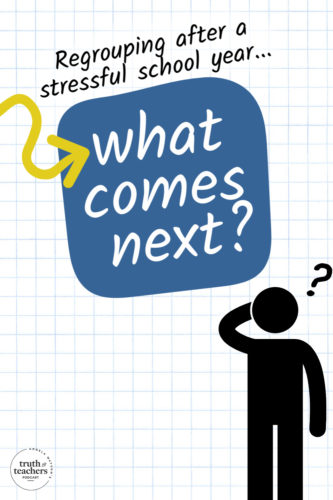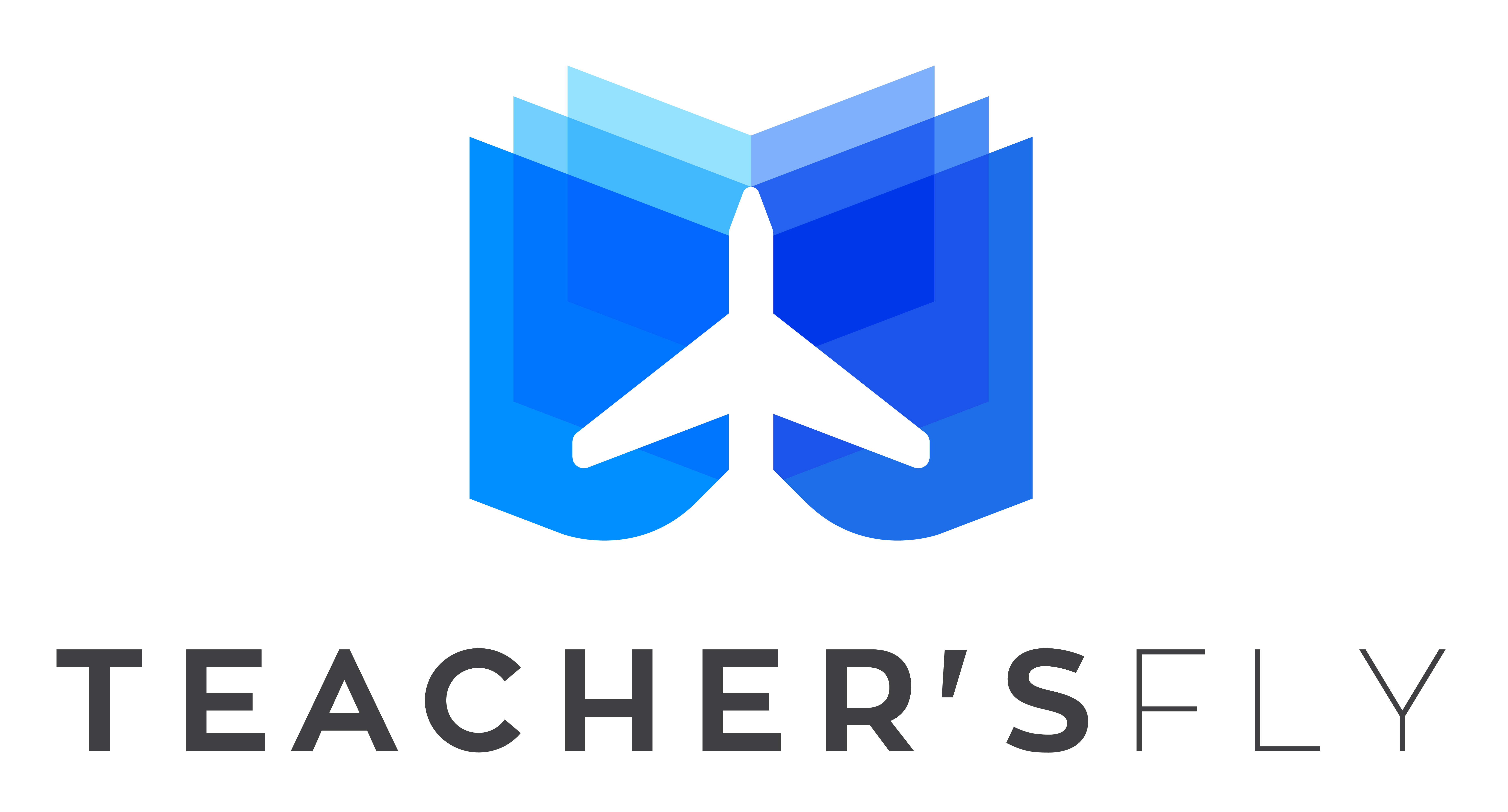
16 May Regrouping after a stressful school year…what comes next?
I think we all need a time of recovery and preparation between school years. And this summer, it’s going to be more essential and critical than ever before.
The summer plan I’m suggesting to help you regroup has three parts:
- Taking a break from thinking about work
- Reflecting on what you learned about yourself and your teaching
- Daydreaming and reimagining the future
Let’s talk about each one individually.

Listen to the audio below,
or subscribe in your podcast app
Sponsored by Advancement Courses and McGraw-Hill Redbird ELA & Math Bundles
1. Taking a break from thinking about work
You know that I took a sabbatical in December…and I’m telling you, that month of not even THINKING about work was transformational for me. There is no way I’d be able to do everything I”m doing with Truth for Teachers and 40 Hour Leadership and 40 Hour Instructional Coaches if I had not taken that time to regroup.
Summer is my busiest time of year, because my job is supporting teachers ,and summer is a big time for PD and webinars and back to school training, etc.
But you have several weeks off unpaid that I urge you to use at least part of for not thinking about work. I’m also going to guide you through your own sabbatical next December during the 2 weeks or so you have off for the holidays, so you can have a mental break from work twice per year.
For now, I want you to actually schedule in time to not think about work: choose a week or two or four or whatever feels right to you in which teaching does not exist. When thoughts about your next group of students or curriculum or whatever pop into your mind, dismiss them and distract yourself with something you want to think about.
You might find during this period — as I did — that when you are not thinking about work, creative ideas and problem solving come to you naturally.
I experimented with this a bit during my sabbatical: sometimes I would give into that and go ahead and brainstorm, writing ideas down so I wouldn’t’ forget and then thinning about other things. Other times, I refocused on the things I wanted to be contemplating and doing right away.
Follow your intuition here: when the thinking feels light, easy, exciting, and energizing in your body, go with that. When it feels heavy, dark, stressful, like a weight on your shoulders, let those thoughts about work go.
So, choose time this summer in which school does not exist. Mark it off on your calendar. Look forward to a true MENTAL and EMOTIONAL break from work.
I think that’s always useful, but especially after this particular school year, which took a huge emotional toll on all of us. Sometimes we don’t realize the impact of trauma until we slow down and get quiet, but we can’t heal from it until we have the space to grieve losses and process what’s happened.
You might think you’re doing just fine until you try to rest. Be prepared for that, and give yourself space and time to sleep more, accomplish less, be less ambitious and productive. You will need days for that this summer because you are a human, not a machine.

2. Reflecting on what you learned about yourself and your teaching
Some people like to journal, or leave themselves voice memos on their phone and just sort of talk aloud. I don’t think you have to make this a formal exercise unless you enjoy doing that. But do allow yourself time to reflect.
I do my best to reflect when I’m in nature or going for walks, I don’t play any podcasts or music and just stay present in the moment. The physical activity spurs my brain to think outside the box and often lots of personal realizations come to me.
Think about what you learned about yourself:
- What kind of person has the pandemic shaped you into?
- What new learnings and understandings have you had over the past year or so?
- What new skills and mindsets have you developed?
- What do you understand now about your personality and preferences that you didn’t know before?
Knowing yourself as a person is an important part of knowing yourself as a teacher. Your lens becomes your practice. The way you see yourself and your world becomes the way you see and treat your students, and shapes what you value in the curriculum and how you run your classroom.
We all have blindspots, things we don’t realize about ourselves, and really taking notice of who you are, what you like and don’t like, what triggers you emotionally to anger or sadness, all these kinds of things will help you truly know and accept yourself.
When you understand your own needs, you will be able to care for yourself so much better.
You’ll know, for example, the limit for yourself on Zoom meetings, and the signs that you’re experiencing Zoom fatigue, and what kinds of activities help you feel better. When you know yourself and your own needs, you can make sure those needs are met and therefore, you’re better prepared to show up as your best self for your students.
As part of this reflection, think about what teaching practices were really stressful for you this year and that you want to find ways to streamline. Think about the parts of your job that you absolutely hate and focus on how to create boundaries for them and simplify.
3. Daydreaming and reimagining the future
The reason why it’s important to reflect this summer as part of the regrouping process between the school years is that this is a transitional time in education. We’re not quite at post-pandemic teaching, but the light is there at the end of the tunnel.
There’s going to be a lot of talk about what expectations to keep and what to let go of:
What parts of pre-pandemic teaching do we want to return to? What parts of remote and hybrid learning are here to stay? What does the future of education look like?
People in your district will have their own ideas here, but I don’t want you to just accept their vision. You know your students and your classroom best. I want you to have your own vision for what you want to focus on with kids and what practices you want to let go of.
Your vision is independent of that of your district: you could transfer to another location at any time and who you are comes with you. Know who you are and what you value in your teaching.
This is also important because there will undoubtedly be many new expectations placed on you in the fall, and you need to be in a headspace to know which ones to wholeheartedly embrace, which to push back on, and which to adapt and simplify so they actually make sense.
Creating practices of reflection will help you make those decisions. The confidence to say, “I’m not doing that” or “I’m going to do that a different way” comes from knowing that you ARE doing the things that make the biggest impact for kids … and if you don’t uncover what those practices actually are, you’re always going to feel guilty when you create boundaries.
Give yourself time this summer to not think about work and get some distance from education, and then once you’ve had a break from it, I think you’ll find you land on greater clarity and more creative solutions.
We all want this reimagining that we’ve been talking about for the past year to actually happen, and I want you to reimagine teaching and learning for yourself. That way ,you’re not blindly following someone else’s vision (especially when that someone else is not an educator and really doesn’t understand the job.)
Know what matters to you and your students, what really makes a difference, so that you can have the confidence to root yourself into that vision next fall.

Resources to support you with regrouping this summer
- I’ll be offering a live webinar this summer on crafting and inspiring vision for fall and preparing for it. So there will be a whole training on this regrouping and transition period. (More details to come)
- Keep an eye out for many new articles on how to regroup this summer from your fellow teachers on our new Truth for Teachers collective.
- I’ll be sharing these on social media, so make sure you’re following Angela Watson on Twitter, Facebook, or Instagram.
- If you’re not into social media, I also have an email list with messages that come out each Sunday night — go to truthforteachers.com to sign up.
- If you are considering a transition out of teaching, check out Daphne William’s Teacher Career Coach course and podcast. There’s lots of resources there to help you figure out what’s next for you professionally if you think you might need a change.
- You can also check out the 40 Hour Teacher Workweek program if you want support streamlining in the new school year, it really does walk you step-by-step through the challenges of each month of the year, from back to school to report card and conference time to rebooting after the winter holidays to ending the school year strong. You don’t have to do this alone, and regardless of whether you join my program or not, please make sure you are finding even a small community of like-minded teachers that can help you share this workload and brainstorm solutions together. It’s open to new members from early June 13 to July 15.We do offer scholarships and are doing a membership giveaway, too, so be sure to check that out.
- Also check out the new 40 Hour Leadership and 40 Hour Instructional Coaches also coming this summer.
See blog posts/transcripts for all episodes
Subscribe to the podcast in iTunes
Subscribe to the podcast in Spotify
Subscribe to the podcast in Google Play
The post Regrouping after a stressful school year…what comes next? appeared first on The Cornerstone For Teachers.
I think we all need a time of recovery and preparation between school years. And this summer, it’s going to be more essential and critical than ever before. The summer plan I’m suggesting to help you regroup has three parts: Taking a break from thinking about work Reflecting on what you learned about yourself and
The post Regrouping after a stressful school year…what comes next? appeared first on The Cornerstone For Teachers. Mindset & Motivation, Truth For Teachers PodcastRead More
Mindset & Motivation, Truth For Teachers PodcastRead More

Sorry, the comment form is closed at this time.